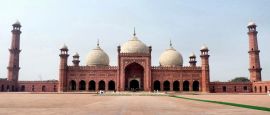Getting around Pakistan
Pakistan's vast size and varied terrain make air travel more efficient than long road or rail journeys.
Pakistan International Airlines (PIA) is the largest domestic carrier. Other airlines, such as AirSial, Airblue, and SereneAir, also provide domestic services, ensuring healthy competition and more options for travellers.
The most popular domestic air travel route in Pakistan is Karachi to Islamabad. The flight takes approximately 1.5 to 2 hours. Other popular routes include Lahore to Karachi, Islamabad to Lahore, and flights to northern destinations like Skardu, Gilgit, and Chitral, which are favoured by tourists seeking access to the mountainous regions.
Travelling by road allows visitors to experience Pakistan's natural beauty and vibrant local culture firsthand. However, driving distances can be long, and traffic in urban areas can be challenging.
Drivers should remain vigilant for unmarked speed bumps, stray animals, and unpredictable local traffic. Night driving is not recommended due to poor visibility and unlit roads. Security checkpoints are common, especially in sensitive areas, so keeping identification and travel permits handy is essential.
The quality of roads in Pakistan varies significantly. The motorways and highways, such as the M2 (Lahore to Islamabad) and the Karakoram Highway, are generally well-maintained and provide smooth travel. In contrast, rural and mountainous roads can be narrow, uneven, and prone to landslides, particularly during the monsoon season. Travellers heading to remote areas should prepare for rough conditions and ensure their vehicle is suitable for such terrain.
International car hire brands such as Hertz and Avis operate alongside well-established local companies in all major cities. Most car rental services offer a range of vehicles, from budget options to SUVs suitable for mountainous terrain. Visitors often choose to hire a car with a driver rather than driving themselves.
Traditional taxis are usually yellow or white in colour, though older black-and-yellow taxis can still be seen in some cities. While taxis are widely available, they rarely run on meters, so fares should be negotiated upfront to avoid disputes.
Tipping taxi drivers is not expected, but rounding up the fare or giving an extra 50–100 PKR is appreciated.
Ride-hailing apps like Careem and Uber have become increasingly popular in cities like Karachi, Lahore, and Islamabad, offering clear pricing, vehicle tracking, and multiple payment options.
Pakistan's scenic regions, such as Gilgit-Baltistan, the Hunza Valley, and the Karakoram Highway, offer stunning routes with breathtaking views. These areas attract touring cyclists from around the world, though the terrain can be demanding, with steep climbs and high altitudes.
However, urban cycling can be challenging due to heavy traffic, limited bike lanes, and unpredictable road conditions.
Daewoo Express, Faisal Movers, and Skyways are the leading coach companies that run routes between major cities. They provide air-conditioned buses with reclining seats, onboard entertainment, and refreshments. Road conditions and travel times can vary, but buses generally adhere to schedules. Advance booking is recommended, especially for long-distance routes or during peak seasons.
Speed limits in Pakistan vary depending on the type of road: 50–60 km/h (31–37 mph) in urban areas, 80–100 km/h (50–62 mph) on highways, and 120 km/h (75 mph) on motorways.
Wearing seat belts is mandatory for drivers and front-seat passengers, and there is a strict zero-tolerance policy for alcohol while driving. Local driving etiquette can be unpredictable, with larger vehicles often assuming the right of way.
Foreign drivers need an International Driving Permit (IDP) alongside their valid home country driver's licence, vehicle registration papers, proof of insurance, and passport.
Urban travel in Pakistan's major cities such as Karachi, Lahore, Islamabad, and Rawalpindi relies on a mix of public and private transport options. Mini-buses and shared vans, commonly known as wagons, are a popular and affordable mode of transportation in urban areas. However, they can be overcrowded and may not follow fixed schedules.
Auto-rickshaws and motorbike taxis are common for short-distance travel, offering quick and flexible options. For intercity commutes within metropolitan areas like Islamabad and Rawalpindi, the Metro Bus Service offers a dedicated and well-organised bus network. Karachi also relies heavily on buses and private vans, though the quality of services can vary widely.
Traditional taxis can be flagged down on the street or hired at taxi stands, but they rarely run on meters. Ride-hailing apps like Careem and Uber are becoming very popular, especially among visitors.
Lahore is the only city with a metro train system, known as the Orange Line Metro Train. It is fully operational and provides a reliable and efficient way to navigate the city.
Rail travel in Pakistan is a popular and affordable way to explore the country, especially for long-distance routes. The Pakistan Railways network connects major cities such as Karachi, Lahore, Islamabad, Peshawar, and Quetta, as well as smaller towns and rural areas. Trains range from basic economy class to more comfortable air-conditioned coaches and sleeper cabins, catering to different budgets and preferences.
The Khyber Mail and Karachi Express are two of Pakistan's most iconic train services. The Khyber Mail operates between Karachi and Peshawar, covering a vast distance across the country and passing through major cities like Lahore and Rawalpindi. It is known for its comfortable seating options, including air-conditioned coaches and sleeper cabins, making it a popular choice for long-distance travel. The Karachi Express, on the other hand, links Karachi with Lahore, providing a faster and more direct route for travellers between these two bustling cities.
Do you have any Feedback about this page?
© 2026 Columbus Travel Media Ltd. All rights reserved. No part of this site may be reproduced without our written permission, click here for information on Columbus Content Solutions.




 You know where
You know where